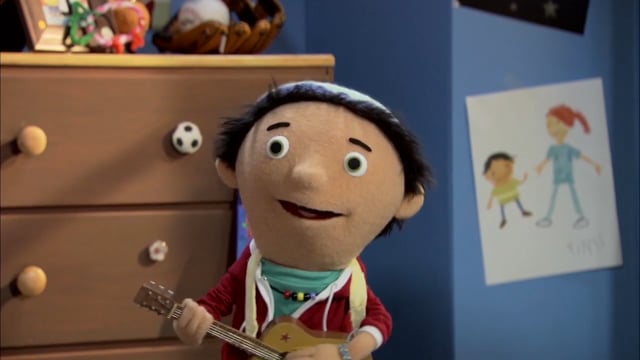Use Finn's Story to Talk About Cancer
What Is "A Boy Named Finn"?
Through puppetry, animation, and song, "A Boy Named Finn" gives young children with cancer a gentle introduction to the basics of cancer treatment. The 12-minute preschool program focuses on comforting themes, including the value of family support.

A Boy Named Finn
Sometimes, little kids get cancer. That's why we created Finn. "A Boy Named Finn" is a 12-minute video that helps young children who are beginning cancer treatment. The show includes puppetry, animation, and real kids who were diagnosed with cancer.
Finn is an upbeat character who was diagnosed with cancer at age 4. In the show, he shares:
- how his parents stayed with him in the hospital
- how he bonded with hospital staff, especially his nurse, and felt comfortable asking questions
- how he adjusted to his hospital stay and mastered tasks like taking medicine
- how some important aspects of life, such as his family's love for him, stayed constant even while he was away at the hospital
- how happy he felt to return home when he was discharged from the hospital
Why Was "Finn" Created?
More than anyone else in children's lives, parents play a key role in helping them through a cancer diagnosis. However, it's hard for parents to hit the ground running because a cancer diagnosis is usually not something they were expecting. It's a lot to adjust to. But Finn's story can help.
For families, some important first steps of cancer treatment are meeting people, such as the child's doctor and care team, and getting familiar with new surroundings at the hospital. And that's exactly what Finn and his family do in this program, which includes interviews with real kids who share their own experiences with cancer treatment as preschoolers.
Preschoolers are naturally playful, imaginative, and active. Finn appeals to them by playing his guitar, singing, and doing some funny dancing. Finn is someone kids can watch, then model his behavior. He is a normal kid, so he admits that during his hospital stay he sometimes felt scared and sad. But when Finn says he adjusted to hospital life, kids learn that they can adjust, too.
Tips for Watching With Your Child
Pediatric oncologists, nurses, social workers, child life professionals, and child psychologists helped create "A Boy Named Finn." They offer this advice to parents who share the show with their child:
- If possible, watch the show first on your own. Then you'll know what's included and can say, "I already watched it and I thought you'd like it, too."
- Consider having a hospital social worker or child life staff member view the show with you and your child.
- Some children will have questions, such as "Will I have to take medicine?" or "Will my hair fall out?" Answer them honestly. But it's also fine to say you don't know, if you aren't sure. Just say, "We'll have to ask the doctor or nurse about that." Then follow up by getting answers to the questions. It's common for kids to ask the same questions over again as they absorb the information.
- Look for opportunities to reassure your child and help him or her feel empowered. For example, if your child has fears about taking a "yucky" medicine, talk about what the medicine is for and predict that your child will get pretty good at taking it. Then, help your child feel a sense of mastery by singing together the funny medicine song from the Finn program.
- Notice how your child reacts to Finn's story. Most kids will be attentive and engaged. It's OK if they are not smiling. They're concentrating. Some children may look away or appear distracted while watching. If this happens, notice what is happening in the show when your child looks away. It could be a sign that he or she is fearful or concerned about what Finn is saying. Consider using it as a conversation starter.
- Allow kids to watch the show more than once. Young children learn from repetition and they might pick up on different messages at different points in their treatment or hospitalization. Look for opportunities to make connections. Example: "You have a nurse, just like Finn. Finn's nurse is named Kelly. Our nurse is Anne."
- Share the show with siblings, teachers, classmates, and family members. It can help inform and educate them as well.
"A Boy Named Finn" was created for kids with cancer, so the story addresses needs from a child's perspective. But it's important for parents to get the support they need, too. Take time for yourself when you can. Even if your instinct is to handle everything yourself, allow others to help you, support you, and give you a break when you need one. In addition to friends and family, many people in the hospital, like social workers, can support and assist you through this challenging time.

